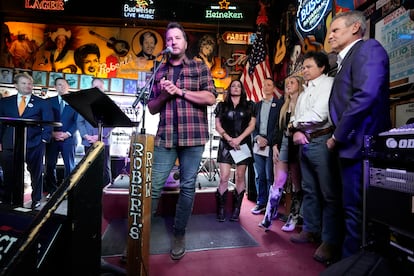Tennessee just became the first state to protect musicians and other artists against AI
Supporters say the goal is to ensure that AI tools cannot replicate an artist’s voice without their consent. The bill goes into effect July 1

Tennessee Gov. Bill Lee on Thursday signed off on legislation designed to protect songwriters, performers and other music industry professionals against the potential dangers of artificial intelligence.
The move makes Tennessee, long known as the birthplace of country music and the launchpad for musical legends, the first state in the U.S. to enact such measures. Supporters say the goal is to ensure that AI tools cannot replicate an artist’s voice without their consent. The bill goes into effect July 1.
“We employ more people in Tennessee in the music industry than any other state,” Lee told reporters shortly after signing the bill into law. “Artists have intellectual property. They have gifts. They have a uniqueness that is theirs and theirs alone, certainly not artificial intelligence.”
The Volunteer State is just one of three states where name, photographs and likeness are considered a property right rather than a right of publicity. According to the newly signed statute — dubbed the Ensuring Likeness, Voice, and Image Security Act or “ELVIS Act” — vocal likeness will now be added to that list.
The law also creates a new civil action where people can be held liable if they publish or perform an individual’s voice without permission, as well as use a technology to produce an artist’s name, photographs, voice or likeness without the proper authorization.
Yet it remains to be seen how effective the legislation will be for artists looking to shield their art from being scraped and replicated by AI without their permission. Supporters like Lee acknowledged that despite the sweeping support from those inside the music industry and unanimous approval from the Tennessee Statehouse, the legislation is untested. Amid ongoing clashes between the GOP supermajority and handful of Democrats, this level of bipartisan agreement is a shocking anomaly.
Many Tennessee musicians say they don’t have the luxury to wait for a perfect solution, pointing out that the threats of AI are already showing up on their cellphones and in their recording studios.
“Stuff comes in on my phone and I can’t tell it’s not me,” said country star Luke Bryan. “It’s a real deal now and hopefully this will curb it and slow it down.”
The Republican governor held the bill signing event at the heart of Nashville’s Lower Broadway inside a packed Robert’s Western World. The beloved honky tonk is often overflowing with tourists eager to listen to traditional country music and snag a fried bologna sandwich.
Lee joked that he and his wife, Maria, sometimes sneak into Robert’s for an incognito date while other lawmakers swapped stories about swinging by the iconic establishment on the weekends.
Naming the newly enacted statute after Elvis Presley wasn’t just a nod to one of the state’s most iconic residents.
The death of Presley in 1977 sparked a contentious and lengthy legal battle over the unauthorized use of his name and likeness, as many argued that once a celebrity died, their name and image entered into the public domain.
However, by 1984 the Tennessee Legislature passed the Personal Rights Protection Act, which ensured that personality rights do not stop at death and can be passed down to others. It states that “the individual rights … constitute property rights and are freely assignable and licensable, and do not expire upon the death of the individual so protected.”
The move was largely seen as critical to protecting Presley’s estate, but in the decades since then has also been praised as protecting the names, photographs and likenesses of all of Tennessee’s public figures.
Now Tennessee will add vocal likeness to those protections.
Sign up for our weekly newsletter to get more English-language news coverage from EL PAÍS USA Edition
Tu suscripción se está usando en otro dispositivo
¿Quieres añadir otro usuario a tu suscripción?
Si continúas leyendo en este dispositivo, no se podrá leer en el otro.
FlechaTu suscripción se está usando en otro dispositivo y solo puedes acceder a EL PAÍS desde un dispositivo a la vez.
Si quieres compartir tu cuenta, cambia tu suscripción a la modalidad Premium, así podrás añadir otro usuario. Cada uno accederá con su propia cuenta de email, lo que os permitirá personalizar vuestra experiencia en EL PAÍS.
¿Tienes una suscripción de empresa? Accede aquí para contratar más cuentas.
En el caso de no saber quién está usando tu cuenta, te recomendamos cambiar tu contraseña aquí.
Si decides continuar compartiendo tu cuenta, este mensaje se mostrará en tu dispositivo y en el de la otra persona que está usando tu cuenta de forma indefinida, afectando a tu experiencia de lectura. Puedes consultar aquí los términos y condiciones de la suscripción digital.








































